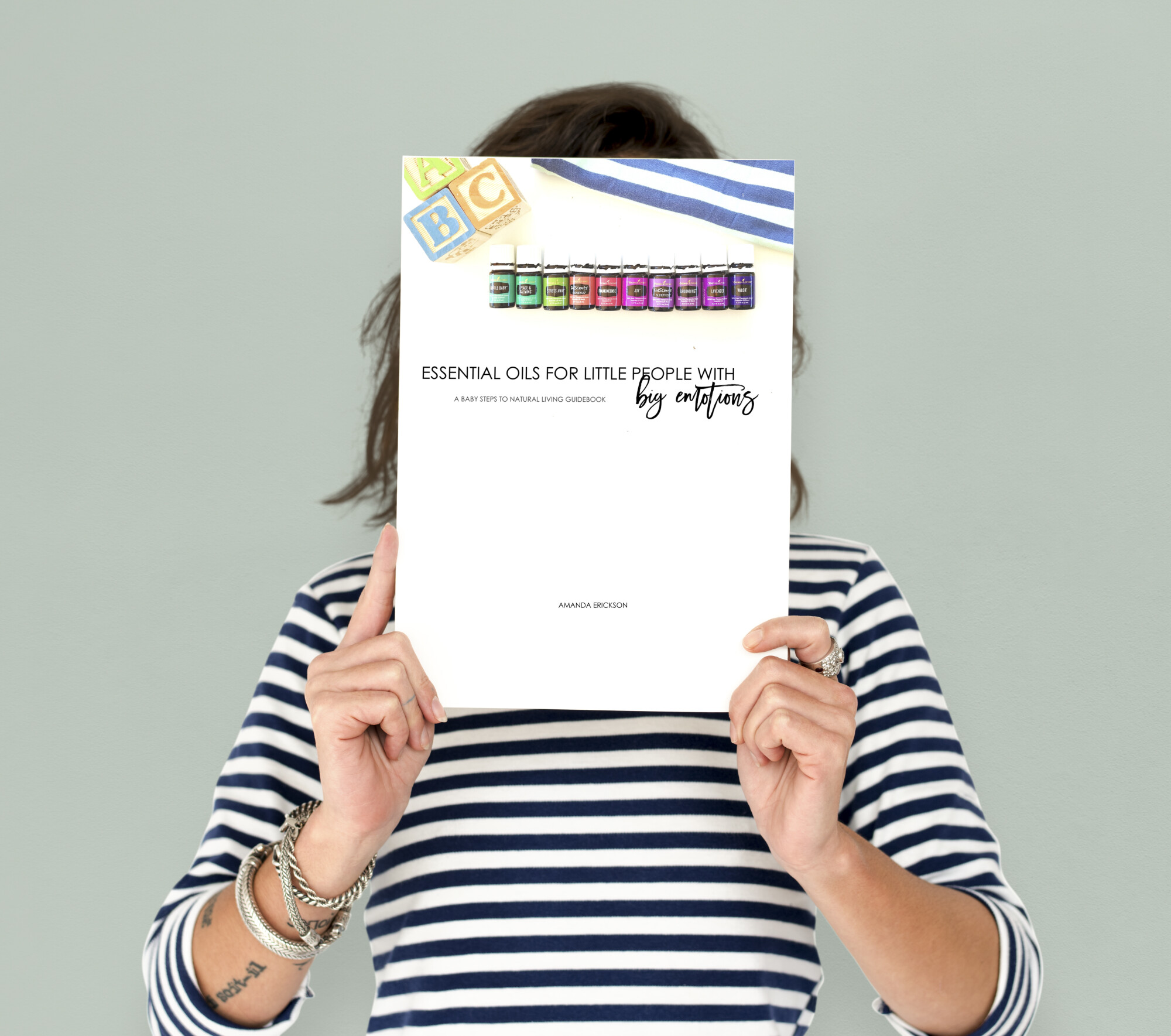LITTLE PEOPLE, BIG EMOTIONS

DOWNLOAD THE GUIDEBOOK
This handy guidebook contains the information found in these lessons on in one handy downloadable document. Print it and use it for quick references any time you're in need of a refresher or reminder.
USING ESSENTIAL OILS WITH CHILDREN
Therapeutic grade Essential Oils come from the earth and are very safe; however, dilution precautions need to be taken with children. You wouldn’t give your child an adult dose of medication, right? Properly diluting your essential oils is so important when using essential oils on babies and children. Remember essential oils are powerful and potent, and a little goes a long way. Make sure to dilute your essential oils with a carrier oil such Young Living’s V6 carrier oil, fractionated coconut oil, or olive oil.
DILUTION RATIOS FOR BABIES & CHILDREN
+ 0-6 months: 1 drop essential oil in 4 tsp. of carrier oil.
+ 6-24 months: 1 drop essential oil in 2 tsp. of carrier oil.
+ 2-5 years: 1 drop essential oil in 1 tsp. of carrier oil.
+ 5-10 years: 1 to 2 drops essential oil in 1 tsp. of carrier oil
+ 10-18 years: 1 to 5 drops essential oil in 1 tsp. of carrier oil
TANTRUM TAMERS
There are very few tools in your parenting toolbox that will serve you better during a tantrum than your essential oils. Essential oils + patience and empathy = a powerful approach to helping calm your little one’s big emotions and set them on a new trajectory. There are a few other tools that may come in handy as well.
+ DON’T BLOW OUT THE CANDLE: Studies show that deep breathing exercises can profoundly impact one’s emotional state, calming anxious feelings and helping bring down the heart rate. Kids need to be taught how to take deep, deliberate breaths. Use your finger or their finger as an imaginary “candle” and help your little one “not blow out the candle.” The idea is for them to concentrate on their breaths being slow and soft, which will help calm down their emotions.
+ CALM DOWN SPACE WITH FEELINGS CHART: Having a safe, soft, and quiet space for a little one to go during a tantrum is an excellent way for them to learn their actions are always acceptable in any location. Create a calm down space with quiet toys and books, a blanket and pillow or cushion, along with a feelings chart. The feelings chart will have different feelings on it (i.e. hungry, angry, sick, tired, jealous, sad), and when your little ones starts to throw a tantrum, help them identify their feelings by asking them to point to their feeling on the chart. This helps them recognize the feeling behind their action and take steps to express those feelings in a safe and acceptable way.
IMMUNE & WELLNESS
Sometimes our little ones give us a head’s up they’re not feeling well by acting out, and sometimes as mamas we totally miss what’s going on. Providing daily support for our little ones’ immune systems is a beautiful responsibility of motherhood, and helps avoid “unexplained” meltdowns.
+GET SOME SUN: Research tells us that exposure to sunlight helps boost the immune system because it increased Vitamin D in the body. In winter months you may need to supplement with Vitamin D3 labeled for children.
+ GET DIRTY: Studies suggest that kids who are allowed to play in the dirt and get all kinds of dirty have more robust immune systems. And children who grow up around animals have a lower occurrence of respiratory illness. Let your kids be kids - and don’t sweat it when you find them eating dirt!
+ ELDERBERRY SYRUP: Elderberry syrup is naturally high in Vitamins A and B, and studies indicate it’s especially beneficial for fighting off the common cold and flu.
+ LOVE YOUR GUT: It’s estimated that 80% of our immune system is in our gut. Take care of your little ones’ gut-health by offering naturally probiotic foods (fermented foods like pickles, yogurt, and kombucha) and greatly limiting their sugar intake. You can supplement with Young Living's MightyPro - a pre and probiotic formulated just for little tummies.
HANGRY
There’s really no question about it, our diet has a profound impact on how we feel. You know the saying “garbage in, garbage out”? When you fuel your little ones with…garbage, you’re going to feel like garbage. Food is FUEL. Fuel your little ones well.
+ CUT OUT: Caffeine, processed sugar, artificial sweeteners, and processed foods. They’re toxic to gut, brain, and immune health and overall wellness.
+ ADD IN: Ningxia Red (2-4 oz daily) for vitamins, minerals, and antioxidants.
You know the time of day: you’re getting supper ready and your little ones are hollering like starving wolves? That’s the perfect time to grab Ningxia Red! It’s full of nutrition, won’t fill them up, and will help with balanced blood sugar levels while they wait for supper. (1/2-1 oz is all a little person really needs.
SLEEP
We’ve all seen an over-tired child. So exhausted, yet fighting sleep like it’s his full-time job. Healthy sleep habits are vital for your child’s wellness, and well-rested children have an easier time being in control of their feelings and actions. Plus, healthy sleep impacts so much of our wellness: from a healthy weight to robust immune systems, balanced hormones to balanced emotions, sleep, or lack-there-of impacts it all.
+ CREATE A ROUTINE: Creating a bedtime routine will help your child recognize when it’s time to shut down for the day. Do the same routine activities at the same time every night to optimize bedtime. Play soft music, turn down the lights, take a bath and brush teeth, read a story, and say prayers. Turn on the diffuser 1/2 hour before bedtime to start creating a peaceful environment.
+ UNPLUG: It’s recommended to turn off electronics and technology a full three hours before going to bed. While this might seem downright near impossible, do give your child time to unplug from technology before you ask her to quiet down for a good night’s sleep.
+ PROTEIN PUNCH: Before heading to bed offer your little one a protein-packed snack. This end-of-day protein punch will help stabilize his blood sugar levels while he sleeps, which helps him (and you!) stay asleep longer.
+ OIL BEFORE BED, SLEEPYHEAD: Create an environment of rest and relaxation by applying oils topically and diffusing them for a restful night's sleep.
FEAR
As children grow they begin to experience different worries and fears. There are common childhood fears that tend to coincide with different stages of development and are generally considered to be completely normal. Fear of loud noises, fear of crowds, fear of new experiences, fear of the dark are just some of the common (and normal!) fears and worries that little people experience. Helping your little one understand and process their fears will instill emotional intelligence into them and set them up to learn courage and bravery as they grow.
+ Before forcing your child to ‘face his fears,’ consider how YOU would feel if someone forced a fear on you. Scared of spiders? How would you feel if someone dumped a cup of spiders on you? Scared of heights? How would you feel if someone forced you to go skydiving? Don’t like small spaces? How would you feel if someone locked you in a closet with the lights off? Those aren’t actually helpful ways to deal with fear, and often escalate our feelings of anxiety. If the answer is ‘NO!’ honor your child’s feelings and move on to another solution.
+ Don’t dismiss your child’s fears. Instead of saying “there’s no such thing as monsters,” (because let’s face it, kids aren’t exactly known for following logic anyway), say “Let’s think of a way to keep you safe. What if Mommy carries the monsters outside and the dogs scare them away?” It’s okay if it sounds silly to you, your child will know you’re taking her fears and concerns seriously.

RESOURCES
+ Rainbow capped roller bottles: http://amzn.to/2wCgELJ
+ Fractionated Coconut Oil (carrier oil): http://amzn.to/2vNDFxM
+ Diffuser bracelets: http://amzn.to/2vv2JXA & http://amzn.to/2vuRE8V
+ The Essential Oil Truth (book): http://amzn.to/2vveZre
+ Gentle Baby (book): http://amzn.to/2uOjBqu
+ The No Cry Discipline Solution (book): http://amzn.to/2fzpupp
+ Should All Kids Use Essential Oils? (podcast): http://bit.ly/2uyFgDJ






